If There Were Dreams to
Sell
Ben Casey
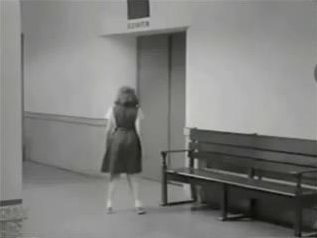
|
Were
dreams to have at will, |
A critique of
pure Pollyanna.
Carry Me Back to Old Tsing Tao
I Spy
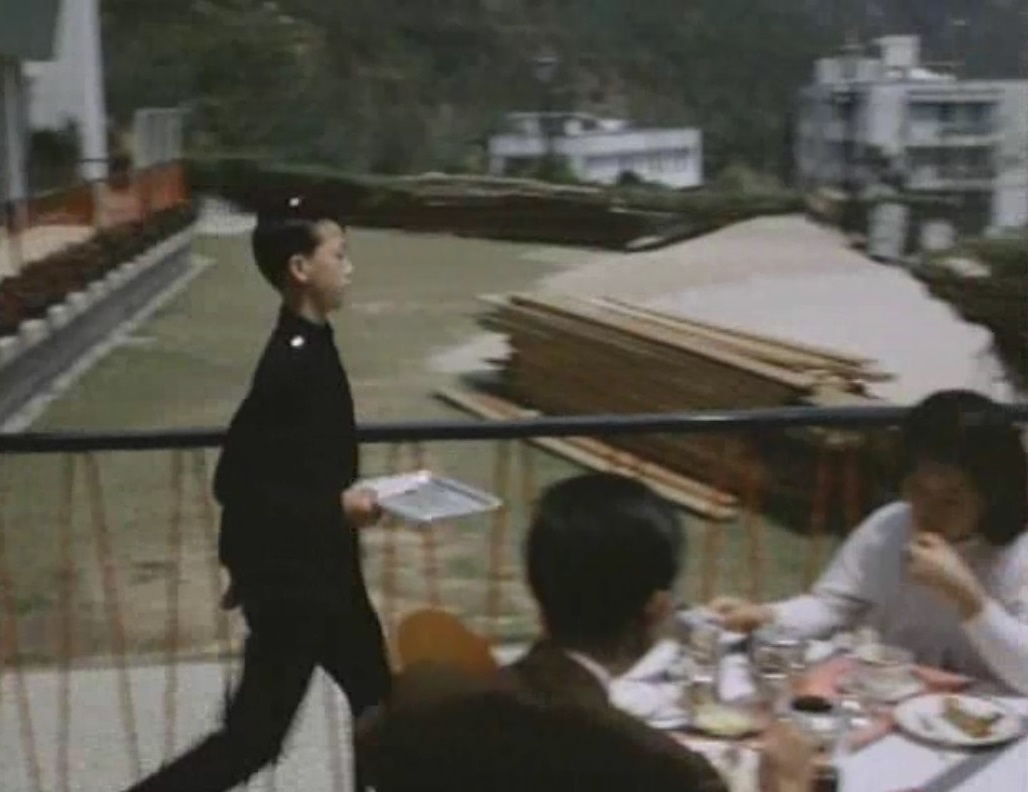
Old China up
against it, cp. Nicholas and Alexandra (dir. Franklin J.
Schaffner). The drift of this is
plain, in the light of Becker’s Goupi Mains Rouges,
then there is Del Ruth’s or Dieterle’s or Huston’s The Maltese Falcon (Satan Met a Lady), and to be sure Hamilton’s Goldfinger by reflection...
A
matter of “Oriental cunning”. Master Po is indicated, his “silver spoon”,
|
I'm used to service abroad |
The Loser
I Spy
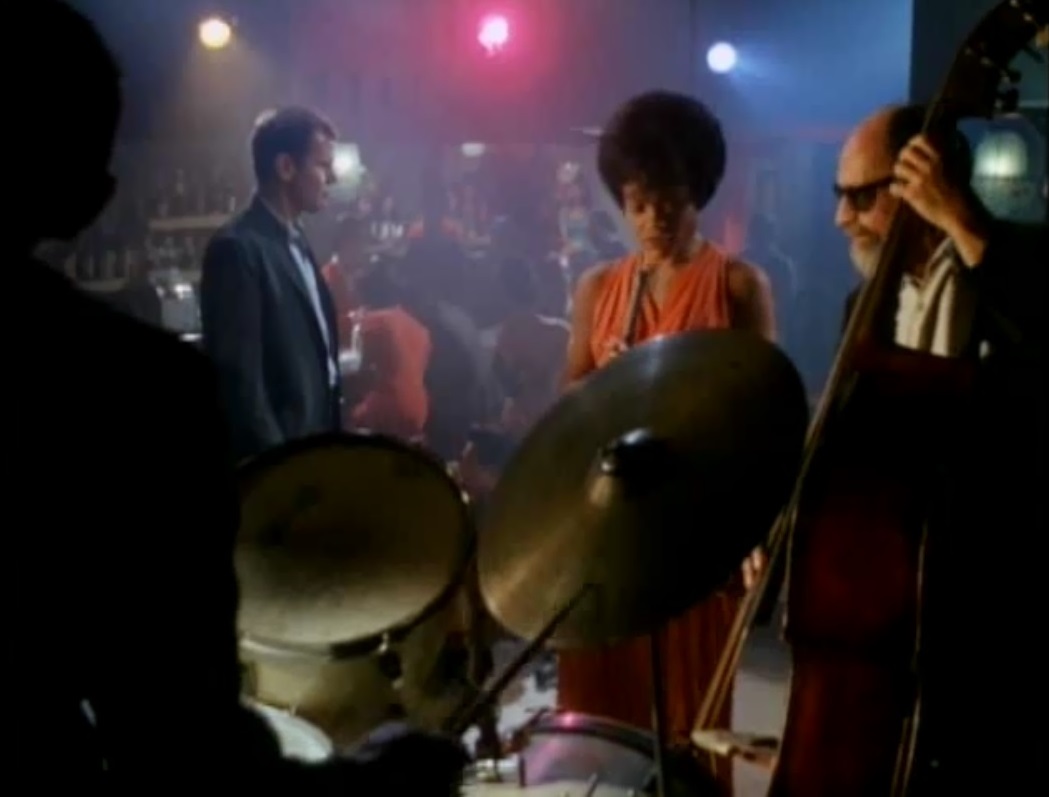
Kidnapped
in the New Territories for seized heroin, Scott in Houdini’s straitjacket
and cuffs. “Well,
that’s showbiz,” says he, identifying Rossellini’s Roma—cittą aperta. Jack Sheldon and ensemble entertain. The
wracked-up singer’s command performance is from Huston’s Key Largo. Scott gets it again from her,
“so long hot shot” (vd. Leo Penn, by the same writer), “don’t get
killed on the way out.” Eartha Kitt as Leo Gorcey, Albert
Paulsen inspired, Mako et al., and Rydell’s genius for gangsters (cf. Cassavetes’ Gloria, Kazan’s The Last Tycoon).
Danny Was a Million
Laughs
I Spy
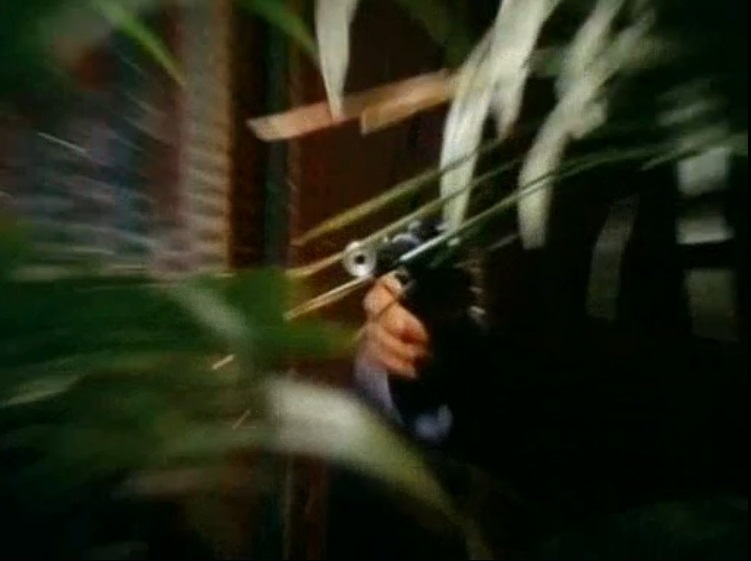
Against him the
bomb in the bread loaf at the floating restaurant, the silencered
pistol at the breakfast joint (Hong Kong blintzes), the tricky car bomb outside
the hotel, and the poor girl who must accept any well-paying employment
offered, no matter what.
The “impure
and inadequate drugs” in the children’s ward are from The Third Man (dir. Carol Reed),
“someone is getting very rich.”
The Night of the Whirring
Death
The Wild Wild West
Dr. Miguelito
Loveless still wants California, which he believes to be his birthright. The
Treasury is bare, Governor Lewis has a plan, three wealthy scoundrels are to
buy respectability in the form of Government bonds, five million dollars’
worth each. The first is a parody of Scrooge, he is to have his own bank. The
second is a builder of deficient bridges, he is to have railroad access. The
third is a madam “interested in music”.
Dr. Loveless has
taken over a toyshop, deadly playthings are sent to the trio, exploding toy
soldiers and railroad trains, a snow globe (“would you like to see it
snow in Donner Pass?”, one of the girls asks West) and a “singing
machine”. Gordon is a La Scala baritone named Caruso.
The three
investors are not killed but captured, the madam looks at the two men bandaged
head to foot in traction, one of them calls her name. “Look at that
thing,” she says, “it knows me!”
The
governor’s plan is to replenish the Treasury and then show these rascals
“how the big boys play.” Dr. Loveless has a small cannon full of
darts waiting, he plans to run for governor himself.
In the opening
scene, West buys a toy for each orphan in the care of the late toymaker’s
granddaughter Priscilla, they are on the street singing, “Throw Out the
Lifeline”. Rydell’s marvelous direction has a camera on the floor
to track a bomb disguised as a wind-up toy of three soldiers marching in rank,
the middle one has a bass drum.
Snap Decision
Gunsmoke
Three men armed,
occupying three positions from the camera, downstage to upstage, A B & C, in
three gunfights.
A dies wrongly,
killed by B fired on by C.
B dies tricked,
challenged by A but shot by C.
A dies rightly,
shot by B menaced by C.
The point is
early expressed as a bounty hunter’s natural tendency to kill a lawman to
get to his quarry, dead or alive.
The Mission
Gunsmoke
An exceptional
allegory, closely related to McLaglen’s The Shadow Riders.
Outlaws in Mexico
bushwhack Marshal Dillon, takes his badge, free his prisoner, slaughter a tiny
garrison, loot a bank and plan a spree. One of them is a lad reared thereabouts
as a scion of the Confederate Army in exile (a sergeant and a colonel, the
boy’s father).
Gunslinger, R.I.P.
Gunsmoke
Two cowboys want
him to kill Matt Dillon for a thousand dollars. Refreshed after a long hot bath
in town, he stumbles into a street scrape and receives two bullets defending a
Chinaman, whose daughter nurses him slowly back to health.
Darren McGavin,
France Nuyen. The cowboys rough her up impatiently, he turns on them.
The Fox
Obviously the
male of the species is not lightly elided, the female either, for that matter.
Lesbians losing
money on a Canadian poultry farm beset by a fox are visited by the grandson of
the place, home from the sea.
He kills the fox.
“Beautifully
photographed,” said Variety, “dramatically uneven.”
“Overdone”,
says Time Out Film Guide, with “overactors” and
“heavily emphatic direction.”
Halliwell’s
Film Guide found “rather
obvious sexual high jinks full of symbolism and heavy breathing,”
signifying nothing.
The Reivers
The truth is
sugarcoated lavishly, but it’s just as plain as the mud trap for
unsuspecting wagoners. Many reviewers have commented on the resemblance to Mark
Twain, meaning The Adventures of
Huckleberry Finn, which is a very good model of composition. Twain has a
device for springing his compositional abilities at once into their true
perspective, and you see something like it here in the horse named Lightning
that just won’t run until it has the scent of sardine in its nostrils.
That’s the
sum of the grand composition, which is beautifully and elaborately filmed in
Panavision. Not many reviewers noticed, Halliwell speaks for the rest.
“Pleasant but unsubstantial yarn of more gracious days, most attractive
to look at, it entertains gently without ever reaching a point.”
The Cowboys
You
couldn’t mistake this for an Italian film, but Rydell expands
Leone’s drama of eyes with an exquisite touch. The scene where the boys
meet the whorehouse wagon is composed almost entirely in medium close-ups or
close-ups, and is just a symphonic development of what the actors’ eyes
reveal. It’s simple enough on reflection, the way all great things are.
Each shot, as clear and distinct as Bruce Dern’s pointing finger in the
scene that follows, leads to the next like Jack and Jill going up that hill.
A great sense of
ease is achieved by having the structure of the film carry its heaviest burden,
which is representing the past without putting too fine a point on it. And
speaking of Italian films, there is the precedent of Phil Karlson’s Hornet’s
Nest.
A cattle rancher
(John Wayne) is forced to hire schoolboys to drive his herd when hands become
scarce. They’re beset by outlaws led by Dern.
Harry and Walter Go to
New York
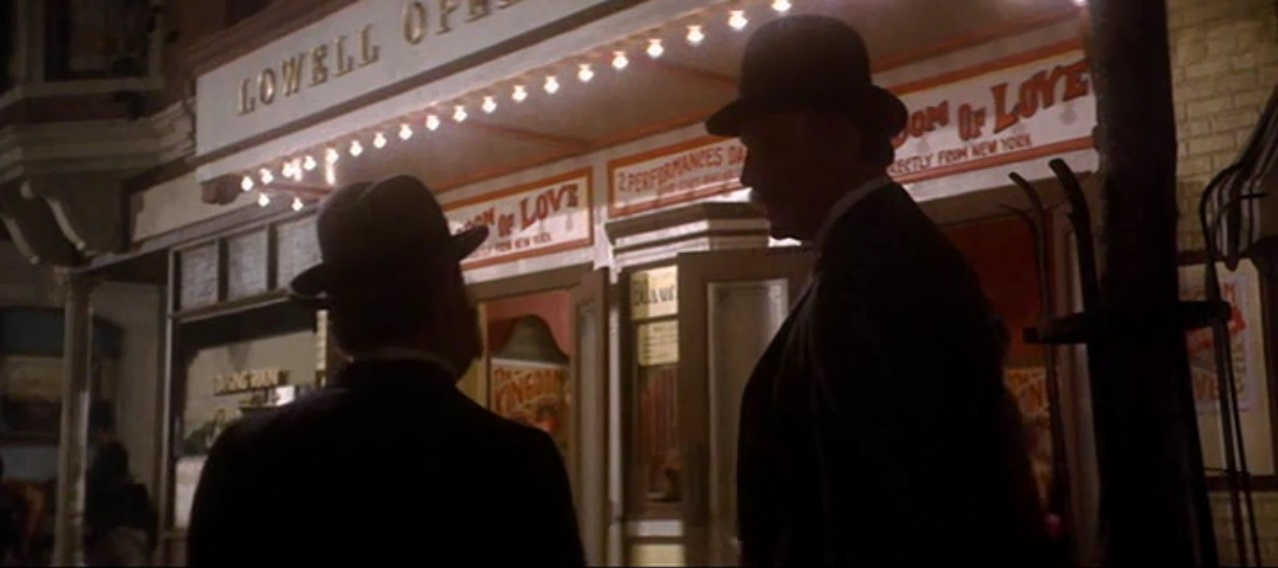
Bad vaudevillians
pick your pocket, grand artistes break the bank. “You drive a hard
bargain, Mrs. Hawthorne.”
The great name of
Lowell is invoked, the poet who once shared a jail cell ever so briefly with
the top man of Murder, Inc.
A question of style, famously (Robin and the 7 Hoods, dir. Gordon Douglas), also a lotta hard work,
to be sure (Valentino, dir. Ken
Russell), a little Laurel and Hardy, a little Jerry Lewis, a little Danny Kaye,
a little more Kingdom of Love.
Vincent
Canby of the New York Times,
“there are two funny moments in the entire film.” Variety, “alleged period comedy”. Roger Ebert (Chicago Sun-Times), “still, the
movie never quite fulfills its promise.” Time Out, “failure realised, and with precious little tingle.” TV
Guide, “a stunningly inept film.” Film4, “shouldn’t
have been made.” Catholic News Service Media Review Office, “slack,
tepid”. Hal Erickson (All Movie
Guide) speaks of “the film’s one tangible asset”. Halliwell’s Film Guide, “a
general lack of talent”, citing an unnamed
reviewer for Sight and Sound, “charmless”, Frank Rich (New York Post), “fails to work”, and Kevin Thomas (Los Angeles Times), “for those
who’ll laugh at anything.”